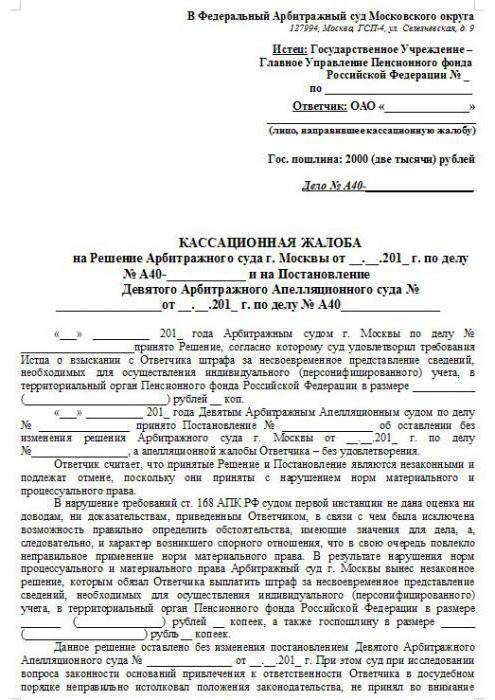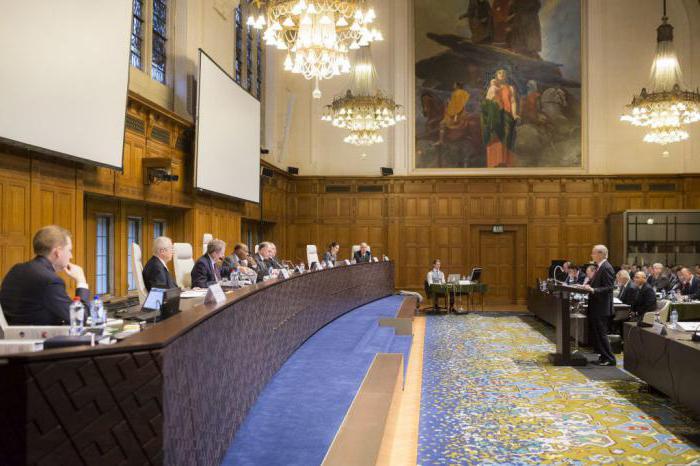How is the cassation appeal on the agro-industrial complex compiled, to which court is it directed, and what must be taken into account, apart from formal requirements?
Cassation proceedings - a review of the decisions of the courts of appeal and first instance, when specified by law. As a rule, the cassation stage is the third link in the judicial system.
According to the APC, the cassation appeal is submitted both to the court, which plays the role of cassation, and to the Supreme Court, the competence of which includes a number of cases.
Production Features
According to the APC, a cassation appeal is filed against decisions that have already entered into legal force. Unlike the acts of the court of first instance, the acts of the cassation bodies are effective immediately after the decision is made. The time limit for appeal and the moment the judicial act enters into force are not interconnected.

The court accepts the documents for consideration, provided that there have been attempts to challenge the court's decisions on appeal, if the appeal stage is mandatory. If it was passed and a cassation appeal was filed, it is rejected without consideration and returned to the applicant with appropriate explanations.
A feature of this type of production is the verification of the correct application of the law. The court is not given the right to verify the correctness of the establishment of facts, unless it has been affected by the correct application of the law.
In the cassation appeal, according to the agro-industrial complex, the question of a new assessment of evidence cannot be raised. The court cannot indicate, referring the matter to the lower court, which norms of law apply and predetermine the essence of the future decision.
This difference is not understood by all authors of complaints to the cassation instance, copying fully the arguments of the appeal. Unfortunately, the reason for this is the not quite well-formulated powers of the cassation stage. This is confirmed by the different approaches of judges in the exercise of their powers.
What acts are lodged with the cassation appeal?
- On the decisions of the first and appeal court.
- On the decisions of the court on intellectual property, adopted by him in the first instance.
- On court orders that were not canceled on time by filing an objection to them.
- The decisions of the courts of first and second instance, the appeal of which is provided for by the cassation board of the Armed Forces of the Russian Federation.
Courts considering these applications
According to the APC of the Russian Federation, a cassation appeal may be submitted to the following courts:
- district arbitration courts;
- intellectual property court.
The latter organizes a panel of judges for the cassation review of disputes, decisions on which were made in the same court, as well as similar disputes, the first instance of which were the arbitration courts of appeal.
District courts are also involved in disputes regarding the recovery of compensation for violation of the time limits for the settlement of disputes.
Terms and procedure for submitting documents
What is the procedure for filing a cassation appeal of the RF agrarian and industrial complex? The document with the attached papers is submitted to the court, which considered the case on appeal.

Papers are transferred directly through the office, through the post office or other service that performs courier functions.
The set received, together with the case materials, is transmitted to the district court or the Armed Forces of the Russian Federation no later than 3 days later. In practice, the shipment is organized later due to the workload of the court apparatus.
The deadline for filing a cassation appeal under the APC of the Russian Federation is 2 months; it is given to send a cassation appeal. For certain types of decisions, a different time period for appeal may be provided.
The applicant is obliged to prove that copies of complaints and the materials attached to it have been sent to other participants.The law refers to materials that other parties do not possess. In practice, it is better to send copies of those papers that other participants already had before.
If a complaint is filed with the Armed Forces of the Russian Federation, then copies of it and documents attached to it shall be attached to it according to the number of parties to the dispute, and one set shall be attached to the court.
At the same time, it is allowed to send documents in electronic form, excluding fuss with a large amount of paper.
If the deadline is missed
The restoration of the deadline for filing a cassation appeal under the RF agrarian and industrial complex is made at the request of the participant in the dispute that has filed the complaint.
The judge returns the petition if he considers that the initiator is late and there are no requests in the complaint or in the documents attached to her for the restoration of the term. The court ruling on the return of securities must indicate this defect.
The clarification indicates that the law does not limit anyone in time with the appeal for the restoration of the term. However, amendments to the Civil Code actually established a 10-year period if the dispute affects the legality of the transaction.

The request is set out in a separate document or combined with the complaint. Which option to choose does not matter, both are correct. This issue is decided by the cassation judge. The duties of the court of appeal or court of the first stage includes only the transfer of papers.
How are timing issues in the RF Armed Forces resolved? The decision of the judge of the economic board regarding the restoration of the term may be appealed to the President of the court or one of his deputies.
What does the document look like?
The complaint is sent to the court in writing or in electronic form. It is filled out on the court website or in the “My Arbitrator” system. The content of the document must comply with a single standard. According to the APC, the cassation appeal to the Supreme Court is almost no different from the same petitions submitted to other arbitration courts. The differences are described below. So, the features of the complaint:
- name of court;
- information about the person filing the complaint and his status (address, phone number, etc., defendant, plaintiff or third party);
- information about other participants in the process, their status;
- the name of the arbitral tribunal that made the decision that is being appealed, or the courts if several decisions have been made;
- details of the appealed judicial act or acts if the disagreement is expressed with several court decisions adopted in the case (number, date of adoption, judges who made the decision);
- grounds for cancellation or amendment of the court decision, available in the opinion of the applicant;
- reference to legislation, court clarifications;
- requirements to the court (to change or cancel a previous decision, to accept a new one or to terminate the proceedings with the decision canceled);
- list of attached documents;
- receipt confirming payment of state duty;
- signature of the person and date of filing the complaint.
The complaint in the Armed Forces of the Russian Federation is distinguished by an indication of what violations of substantive and procedural law, according to the applicant, are significant.

Are there cassation appeal samples for the agro-industrial complex? There are a lot of them, starting from forms, ending with full-fledged documents with all the details and arguments. But it makes sense to use other people's samples only for educational purposes, especially if there is no reliable information that they have achieved success with their help.
Features of appeals in cases of compensation for judicial red tape
In addition to the existing complaint requirements, the following arguments and information must be available:
- calculation of the duration of the proceedings (from the day the claim is filed in court to the day the final decision is made);
- circumstances that, in the applicant's opinion, entailed a delay in the consideration of the dispute;
- other arguments of the applicant;
- calculation of the amount requested by the applicant;
- negative consequences for the applicant in connection with the violation of the terms of consideration of the case.
Appeal against decisions taken under the simplified procedure
The requirements for filing complaints are regulated by the rules of the agro-industrial complex, which are devoted to cassation proceedings in district courts. Judges have the right to call parties to a dispute if, without their explanation, the case is not resolved without violating the principle of justice.

In this category of cases, the following violations of procedural rules are accepted that may entail the annulment of a decision:
- the judge did not have the right to consider the case because of interest;
- rules on the language of the proceedings were violated, for example, one of the participants was not given the opportunity to use the services of an interpreter;
- a court act affects the rights and obligations of persons not involved in the process, an example is the case of non-involvement of third parties, in particular government bodies;
- on the decision are the signatures of the judges who did not participate in the process;
- the protocol is absent in the case file or signed by the person who did not take part in the case (judge, clerk of the meeting or assistant judge serving as clerk).
Representation
If the representative has not previously participated in the process, a copy of his power of attorney is attached. If he had previously participated in it, then formally, a copy should not be attached, but in order for the judges not to have doubts, she should still be present.

Lawyers, directors, and other officials performing administrative functions take part in arbitration proceedings. The right to represent organizations by them is confirmed by extracts from the constituent documents or by orders on the appointment of the founders.
If the representative acts by proxy, the authority of the person issuing it must also be confirmed. The judge must ensure that the credentials are delegated by the right person.
Acceptance of complaint
A set of documents is handed over to one of the judges. His task is to verify the compliance of the application with the law.
If the papers are in order, the issue of appointing a meeting, the date of its holding, and other organizational issues is being decided. The judge’s preparations for the meeting are noted in the ruling on the opening of proceedings. It is sent to each of the participants in the case.
The law contains a clause stating that a complaint must be accepted for proceedings no later than the expiration date for the appeal.
The judge, believing that there is a violation of the form and content of the document, leaves it without movement and gives time for correction.
Features of the adoption of a complaint in the RF Armed Forces
The procedure in the RF Armed Forces does not provide for leaving the application without movement, there documents that do not meet the requirements are immediately returned to the applicant. If the deadline for submitting paper has not expired, the applicant is left with the opportunity to submit a new application taking into account the previously existing deficiencies.

Based on the correct complaint, from the point of view of registration, a decision is made on its prospects. The judge has two options:
- transfer materials for consideration to the economic board;
- refuse to open production and not transfer the case to the board.
The decision of the judge may be appealed to the President of the court, and he or his deputy shall verify the legality and validity of the applicant’s refusal to open proceedings. They have the right to cancel the decision on refusal and refer the matter to the board.
There are no time limits on how to appeal to the President of the court, by law.
Thus, according to the APC of the Russian Federation, a cassation appeal to the Supreme Court gives a much less chance of winning.